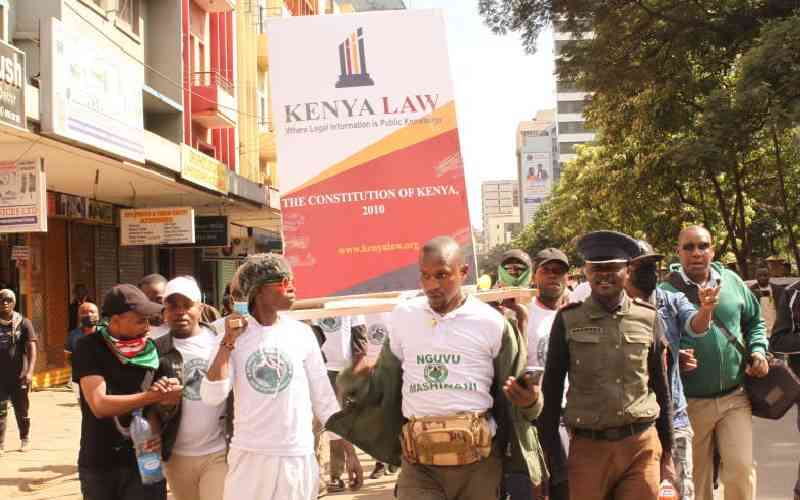Bunge la Mwananchi members during anti-Finance Bill protests along Moi Avenue, Nairobi, on June 26, 2024. [File, Standard]
In urban centres of Africa, a new form of political engagement is taking root. It’s not a political party or a formal institution, but a vibrant, grassroots phenomenon known as the citizen parliament. These unlegislated bodies operate in public spaces, offering an alternative to formal legislatures, often seen as detached and inaccessible.
In Kenya, this movement is embodied by Bunge la Mwananchi, in Senegal, it’s the Cité-Débat (debate in the city) and in South Africa, the traditional Indaba; all function as crucial public spaces for holding power to account.
The rise of citizen parliaments is a direct response to a crisis of legitimacy facing modern representative democracy. There is a huge disconnect between formal parliaments and the people. A political class has emerged often physically and socially removed from the public.
Follow The Standard
channel
on WhatsApp
In Kenya, this crisis is compounded by a perception that the legislative arm has abdicated its core function of oversight. The Executive’s perceived dominance over Parliament, a concern amplified by debates on the Finance Bill, has fueled public frustration. This is further intensified by public accusations of extortion against parliamentary committees, as highlighted by President William Ruto. These allegations of “money-minting rings” directly challenge the integrity of the institution meant to be the public’s primary check on power.
At its core, the citizen parliament operates as a modern manifestation of indigenous African governance, rooted in principles of communalism and consensus-building. To understand this, one can apply the Political Opportunity and Public Sphere Theory, which explains how these movements emerge by using public spaces to create an alternative public sphere for debate. Bunge la Mwananchi, for example, took root in the same Jeevanjee Gardens that activists, including the late Nobel Laureate Wangari Maathai, protected from being grabbed.
Here, the rules are simple: there is no formal dress code—you come as you are. If your shoes have seen better days, you are welcome. Language is also not a barrier; debates can be heard in a mix of Sheng, Dholuo, Kikuyu, or English, ensuring that all can participate. This deliberative style, like the Indaba model, values every voice, with the strength of an argument mattering more than a person’s social standing.
The constitutional imperative for public participation has been accelerated by technology. The use of smartphones has turned everyday citizens, including Gen Z, into citizen journalists, creating a real-time record of events and concerns. In a powerful display of a hybrid system at work, the IEBC has even overseen Bunge la Mwananchi’s recent peaceful elections, a collaboration that shows these informal movements are not only gaining a voice in the public sphere but are also achieving a level of recognition and legitimacy from established government bodies, paving the way for a more integrated approach to governance.
Despite their promise, citizen parliaments face significant challenges. Their informal nature, while a source of strength, also makes them vulnerable. The movements have been criticised for lacking formal structures and having members with numerous, overlapping agendas, which can create internal conflicts.For these movements to remain a credible force, they must navigate the tension between their organic identity and the pressure to formalise. They must continue to resist becoming a political party, which would risk introducing the very bureaucracy and elite politics they were created to oppose.
Instead, their path forward lies in becoming a nationwide network of citizen assemblies, leveraging technology to create digital community hubs that can hold local and national governments accountable.
-The writer comments on topical issues
Follow The Standard
channel
on WhatsApp
By Wanja Maina
